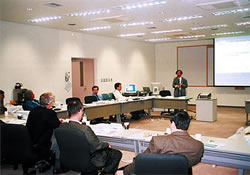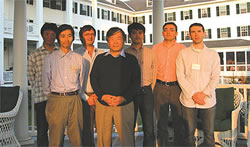New Research Units Started and Group Name Changed
The Critical Period Mechanisms Research Group in the field of Nurturing the Brain established a second research unit, the Hashimoto Research Unit (Unit Leader : Mitsuhiro Hashimoto) in June, 2004, and additionally a third one, the Shimogoori Research Unit (Unit Leader: Tomomi Shimogoori) in August, 2004. The Hashimoto Research Unit is aiming to explain the cellular and molecular mechanisms of the cerebellum, and the Shimogoori Research Unit is implementing a study to investigate causes of thalamic nuclei generation that acts as an input source to the cerebrum.
In accordance with Dr. Hitoshi Okamoto's assumption of the Group Director's position in August, 2004, the Recovery Mechanisms Research Group has been renamed the Neural Growth Regeneration Research Group.
6th BSAC Meeting
The 6th Brain Science Institute Advisory Council (BSAC) met for 3 days, from April 12 to 14, 2004. 18 prominent scientists from around the world fit on this council, and it is chaired by Dr. Zachary Hall. The council's mandate is to evaluate the operating management of BSI and to provide advice and recommendations for future development. Most of members of the original BSAC retired after the first phase of BSI's development ended, and the new members of the advisory council will provide fresh insights and perspectives in the reviews of BSI throughout the second phase of development.
The quality of BSI activities, in particular of its human resources including the appointment of female laboratory heads, was noted in this year's BSAC report. The report also praised the appointment of unit leaders to ensure the independence of young researchers. In addition, the following recommendations and concerns were also includd in the report.
- The need to establish of priorities for future development is becoming extremely important.
- Develop systems neuroscience that exploits BSI's expertise in genetic manipulation of rodent neural systems.
- Recruit a systems neurophysiologist to assess behavioural and electrophysiological consequences of genetic manipulations.
- Develop system study of the nervous system from molecules to behaviour in a single organism.
- Develop research opportunities that are aligned with the needs of RIKEN BSI's ongoing research in all areas.
- Significant recruitment efforts at the Group Di rector level are needed.
- Promote more communication and collaboration between Laboratories.
- Set aside funds at the Director level to be awarded on a competitive basis for collaborative projects across laboratories and groups within RIKEN BSI.
- Included collaboration across laboratories and groups into the evaluation of individual scientists.
- Forming journal clubs within and across groups is encouraged.
- The institute should consider ways to improving researcher experience at RIKEN at the institutional level.
- Avoid isolating researchers.
- Make short introductory courses in specialized areas of neurobiology available.
- Consider hiring a full time science writer.
- RIKEN BSI should encourage graduate students and expand opportunities for them. Establishing a graduate training program is one possible option.
- RIKEN BSI determine its projected needs to plan future facilities.
- Continue to hold reviews by the Advisory Council in the future.
RIKEN-MIT Neuroscience Research Center Retreat
Six members of the RIKEN Brain Science Institute participated in the Picower Center for Learning and Memory annual retreat this June (7-9) in Kennebunkport, a resort town on Maine's rocky coast. BSI researchers interacted with MIT principal investigators, postdoctoral fellows and graduate students through presentations and discussions and also found sometime for socializing.
“Attending the Picower Center retreat was a great experience for me, particularly as I find myself increasingly interested in memory and learning,” said Niall Murphy, Unit Leader of the Neuronal Circuit Mechanisms Research Group. “What I learned at the retreat will impact my work and help strengthen the collaborations between labs in BSI and RIKEN-MIT.”
In his keynote address, Prof. John Lisman of Brandeis University reviewed the historical development of our understanding of the synapse's role in memory and highlighted areas where gaps remain. BSI's Tadafumi Kato, Laboratory Head, discussed his recent work on bipolar disorder.
BSI researchers visited a few of the laboratories at MIT, including the laboratories of Susumu Tonegawa, Group Director of the RIKEN-MIT Neuroscience Research Center. They also visited Elly Nedivi's laboratory, which is searching for genes that help build neural connections for learning and memory.







